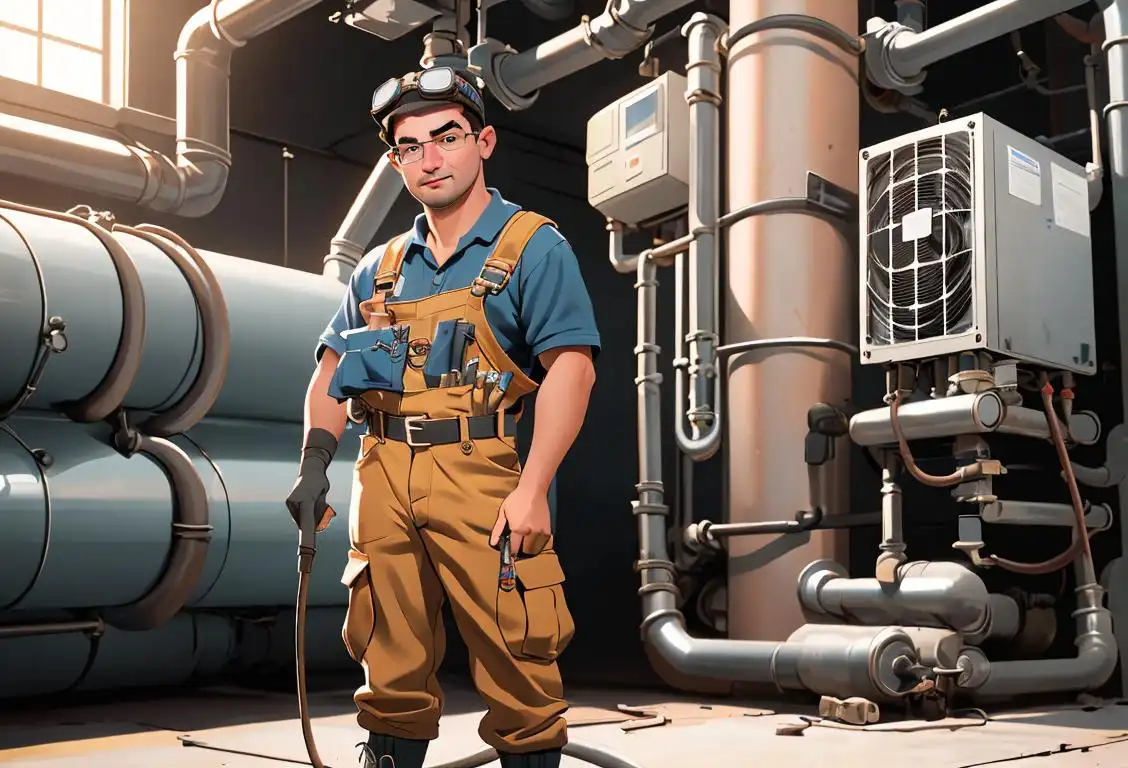National Hvac Technician Day

Hey there, HVAC enthusiasts! Get ready to celebrate National HVAC Technician Day, a day dedicated to those unsung heroes who keep us cool in the summer and warm in the winter. Let's dive into the fascinating world of heating, ventilation, and air conditioning and uncover the internet history of this special day.
When is Hvac Technician Day?
It's national hvac technician day on the 22nd June.
The Origins of National HVAC Technician Day
Have you ever wondered how National HVAC Technician Day came to be? Well, grab your magnifying glass (or a cup of coffee, if you prefer) because we're about to investigate the origins of this fantastic holiday.
Back in 2016, the International Association of Plumbing and Mechanical Officials (IAPMO) founded National HVAC Technician Day to recognize the hard work and dedication of HVAC technicians worldwide. These unsung heroes keep our homes and businesses comfortable all year round.
HVAC Technician Fun Facts
Now, let's warm things up with some fun facts about HVAC technicians! Did you know that the first air conditioning system was invented by Willis Carrier in 1902? It was designed to control the temperature and humidity in a printing plant. Talk about a cool invention!
How to Celebrate National HVAC Technician Day
It's time to show some love to those hardworking HVAC technicians! Here are a few ways you can celebrate National HVAC Technician Day:
- Send a thank you note or a friendly message to your favorite HVAC technician.
- Bake some cookies or bring in some treats for the technicians working at your home or office.
- Leave a positive review for your HVAC technician online or recommend their services to friends and family.
Remember, a little appreciation goes a long way in making these unsung heroes feel valued and appreciated.
History behind the term 'Hvac Technician'
1902
The Invention of Modern Air Conditioning
In the year 1902, the modern air conditioning system was invented by Willis Carrier. He created this revolutionary technology to control indoor humidity and provide a more comfortable environment. This invention laid the foundation for what would later become the HVAC (Heating, Ventilation, and Air Conditioning) industry.
1920s
The Emergence of Home Cooling Units
During the 1920s, home cooling units began to gain popularity. These units used similar principles to the larger commercial air conditioning systems and were composed of separate heating and cooling components. The demand for these units grew rapidly as people realized the benefits of indoor climate control.
1930s
Expansion to Include Heating Systems
In the 1930s, the field of air conditioning expanded to include heating systems as well. This marked the beginning of the HVAC industry as we know it today. Heating, ventilation, and air conditioning systems were now capable of providing both cooling and heating functions, making them versatile and essential for maintaining comfort in various environments.
1940s
Post-War Boom and Increased Demand
After World War II, there was a massive boom in residential and commercial construction, leading to a substantial increase in the demand for HVAC systems. As more buildings were constructed, the need for HVAC technicians grew exponentially. The industry started to professionalize, and specialized technicians began to emerge to handle the installation, maintenance, and repair of these systems.
1970s
Focus on Energy Efficiency and Environmental Impact
In the 1970s, growing concerns about energy consumption and environmental impact led to a shift in the HVAC industry. Efforts were made to improve energy efficiency and reduce the use of harmful refrigerants. HVAC technicians played a significant role in implementing these changes by adopting more efficient technologies, such as high-efficiency furnaces and air conditioners, and transitioning to eco-friendly refrigerants.
1990s
Advancements in Digital Control Systems
The 1990s witnessed significant advancements in digital control systems for HVAC units. With the introduction of programmable thermostats and automated control systems, HVAC technicians gained more efficient ways to regulate indoor environments. These technological advancements have continued to evolve, culminating in the development of smart home automation and intelligent HVAC systems in recent years.
Did you know?
Did you know that HVAC technicians have to be certified and undergo specialized training? They go through rigorous education programs to ensure they have the knowledge and skills to keep our HVAC systems running smoothly.Tagged
fun loved onesFirst identified
22nd June 2017Most mentioned on
22nd June 2018Total mentions
60Other days
Medal Of Honor Day
Cheese Pizza Day
Foundation Day
Cancer Survivors Day
Suicide Prevention Day
Compliment Day
Memorial Day
Guac Day
Pumpkin Day
Bacon Day









